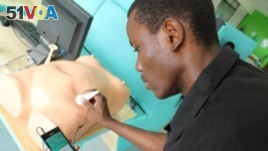From VOA Learning English, this is the Technology Report.
这里是美国之音慢速英语科技报道。
Three university students in Uganda have created a smartphone application that may help improve health care for pregnant women in rural areas.
乌干达的三名大学生创建了一个智能手机应用程序,它可以帮助改善农村地区孕妇的医疗保健。
Joshua Okello and two other students at Makerere University in Kampal created the app in 2012. They call it WinSenga - "senga" is the local word uses to describe a female family member who helps a woman during pregnancy. The "Win" in the name comes from the Microsoft product Windows.
坎帕拉市马凯雷雷大学的约书亚·奥凯洛(Joshua Okello)和另外两名学生于2012年创建了这个应用程序。他们称之为WinSenga。Senga是当地话,用于称呼帮助孕妇的一位家庭女性成员。名字中的Win则来自微软公司的产品Windows。
Last year, the computer software company gave Mr Okello and his partners $50,000 to continue development on the WinSenga app.
去年,这家计算机软件公司给了奥凯洛及其同伴5万美元用于WinSenga应用程序的继续开发。
A small microphone is placed inside a plastic horn. Mr Okello says midwives in the area have used similar devices for centuries to help women during childbirth.
一个小麦克风放置在一个塑料喇叭的里面。奥凯洛说,该地区的助产士们几百年来都使用类似设备帮助孕妇分娩。
"It's a long cone-shaped device with a hole through it and a flat top. The midwife places it on the belly and listens in. Every midwife in this country has seen it, and that is what they are trained with," said Okello.
奥凯洛说,“这是一个中空、顶部平坦的长圆锥形装置。助产士将其放在腹部监听(胎心)。这个国家的每个助产士都见过它,她们也都受过这种培训。”

2013年11月29日,奥凯洛在孕妇模型上演示WinSenga
The smartphone app records and examines the sound of the unborn baby's heartbeat. Mr Okello says, if the app suspects a problem, then it informs the midwife of different actions she might take.
该智能手机应用程序会检查记录胎儿的心跳声。奥凯洛表示,如果该应用程序怀疑有问题的话,它就会提示助产士可以采取的其它操作。
"Say you have a baby and we detect that the heartbeat is less than 120 beats per minute. That is a problem. So immediately, we pop up something that says ‘Please, we suggest that you could do A, B, C, D,'" explained Okello.
奥凯洛解释道:“假设你怀了小孩,我们检测到心跳低于每分钟120次。这就有问题。所以我们马上弹出消息提示:‘拜托,我们建议你采取A、B、C、D等操作。’”
Mr Okello says having a mobile device with this app could make it easier for health care workers to reach women in villages far away from cities. He says it will also be less costly than the machines that are now being used.
奥凯洛表示,有了安装这个应用程序的移动设备,可以让医务人员更容易覆盖远离城市的农村的妇女。他说,它比目前使用的机器成本也更低。
"We are getting a solution that's cheaper, which means that more clinics are going to get it. If we could get Huawei or I don't know who to give us phones for free, we are looking at a solution that's less than $100," said Okello.
奥凯洛说,“我们得到了一个更廉价的解决方案,这意味着更多诊所将可以得到它。如果我们能够让华为或哪个公司免费给我们手机,我们将考虑一个低于100美元的解决方案。”
Juliet Birungi is an obstetrician - a doctor who cares for pregnant women. She has tried WinSenga. She says hospitals could use the app to help medical workers follow the health of the baby, even when they are not there.
朱丽叶·比拉吉(Juliet Birungi)是一位照料孕妇的产科医生。她曾试用过WinSenga。她说医院可以使用该应用程序帮助医务人员跟踪宝宝的健康状况,即使当他们不在这里。
"You have so many mothers in labor, and we do not have enough staff. You find that while the mother is laboring here, the other one is delivering, the other one is bleeding. So when you come, you are able to look at the recording," said Birungi.
比拉吉说,“这么多妈妈在临产,我们人手不够。你会发现,当这位妈妈在临产,另一位在接生,另一位在流血。所以当你一来,你就能看看记录。”
Doctor Birungi says having these up to date records of the baby's health condition, could make the difference between life and death. But she says the app is not a substitute for a trained medical worker.
比拉吉医生表示,有了这些宝宝健康状况的最新纪录,可以制造生与死的差异。但她表示,该应用程序不是训练有素的医务人员的替代者。
Mr Okello says the app could also be helpful in other developing countries with similar problems to Uganda. And he says, with further changes to the app, it could even be used at home by pregnant women in developed countries.
奥凯洛表示,该应用程序还可以帮助和乌干达有着类似问题的发展中国家。他还表示,经过进一步改进,它甚至可以让发达国家的孕妇在家里使用。
Work on WinSenga continues. Mr Okello and his team are busy preparing for a major series of clinical testing this month.
WinSenga的开发工作还在继续。奥凯洛和他的团队正忙着准备这个月的一系列重大临床试验。(51VOA.COM对本文翻译保留全部权利,未经授权请勿转载,违者必究!)